Jamie Marchant's Blog, page 31
October 29, 2016
The Goddess's Choice audio, Chapter 5
Delve further into the lives of Robbie and Samantha in this week's installment of The Goddess's Choice on audio
Published on October 29, 2016 03:00
October 28, 2016
5 Ways of Presenting Characters: Character as Voice
Last week we talked about using image to present your characters. This week I want to discuss a second way of character presentation: voice. In the same manner that you tell from a couple of words over the telephone who you’re speaking to, your readers should be able to recognize a character from her/his voice. All characters should have their own way of talking marked by difference in diction (word choice), rhythm, and style. In addition to differentiating between characters, the words a character uses and the manner of her/his speech can reveal a lot about the person.
 Blaine, who begins The Goddess’s Choice as an undersecretary in the library, reveals himself through his speech. When he is summoned by the princess, the chief librarian asks him if he has offended the princess. He replies, “I-I don’t know. I-I had no intention of doing so. I-I did see Her Highness in the clerks’ office earlier, but I did bow, and I’m sure I did it appropriately. At least, I-I think I did. I did it exactly as you said I should if I ever passed her in the halls. At least, I think I-I did.” As you can see, he talks too fast, says too much, and stammers. With these few words, the reader sees that he is very unsure of himself. This is further emphasized when the princess makes him her secretary and asks his opinion of her plans for the king’s birthday celebration. He responds, “Well, I’m sure Your Highness knows what she’s doing, and if you like things this way, I’m sure it’s a perfectly fine way to have them. I know I have very little experience, and Your Highness must have a very good reason for having—” The princess has to cut him off to get an answer.Even without attributions, readers would never confuse Blaine with Darhour. Darhour strikes terror into the new secretary with few words. He threatens, “I am Captain Darhour, the commander of the princess’s personal guard. Her safety is my responsibility.” Darhour speaking those few words causes Blaine to fear for his life. Darhour doesn’t need to say much to cause men to “piss in their pants.”
Blaine, who begins The Goddess’s Choice as an undersecretary in the library, reveals himself through his speech. When he is summoned by the princess, the chief librarian asks him if he has offended the princess. He replies, “I-I don’t know. I-I had no intention of doing so. I-I did see Her Highness in the clerks’ office earlier, but I did bow, and I’m sure I did it appropriately. At least, I-I think I did. I did it exactly as you said I should if I ever passed her in the halls. At least, I think I-I did.” As you can see, he talks too fast, says too much, and stammers. With these few words, the reader sees that he is very unsure of himself. This is further emphasized when the princess makes him her secretary and asks his opinion of her plans for the king’s birthday celebration. He responds, “Well, I’m sure Your Highness knows what she’s doing, and if you like things this way, I’m sure it’s a perfectly fine way to have them. I know I have very little experience, and Your Highness must have a very good reason for having—” The princess has to cut him off to get an answer.Even without attributions, readers would never confuse Blaine with Darhour. Darhour strikes terror into the new secretary with few words. He threatens, “I am Captain Darhour, the commander of the princess’s personal guard. Her safety is my responsibility.” Darhour speaking those few words causes Blaine to fear for his life. Darhour doesn’t need to say much to cause men to “piss in their pants.”
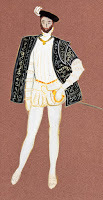 The villain of the piece, Argblutal, reveals his contempt for women by the words he uses to describe them. He tells Count Nola, “Everything about Her Highness is my business. I will marry her. No chit is going to keep me from the throne that should have been mine by right of blood.” And “chit” is one the nicer words he uses to describe her. His thoughts further the reader’s distaste for him. “The air of authority in her voice grated on the duke. His groin tightened as he thought about the deliciousness of teaching her a woman’s proper place. He imagined her naked and tied to his bed. Her breasts were a good deal smaller than he preferred. But as he imagined thrashing them with his cat-o-nine, no breasts had ever excited him more.”To get a character’s voice right, you need to place yourself in the character’s mind. Inhabit the character and see what words come pouring out. Through it all, it’s important to remember your job is getting your readers to care about your characters. It’s impossible for him/her to care much if they all sound like carbon copies of each other. Tell me what you think, or describe the way your favorite character speaks in the comments below.
The villain of the piece, Argblutal, reveals his contempt for women by the words he uses to describe them. He tells Count Nola, “Everything about Her Highness is my business. I will marry her. No chit is going to keep me from the throne that should have been mine by right of blood.” And “chit” is one the nicer words he uses to describe her. His thoughts further the reader’s distaste for him. “The air of authority in her voice grated on the duke. His groin tightened as he thought about the deliciousness of teaching her a woman’s proper place. He imagined her naked and tied to his bed. Her breasts were a good deal smaller than he preferred. But as he imagined thrashing them with his cat-o-nine, no breasts had ever excited him more.”To get a character’s voice right, you need to place yourself in the character’s mind. Inhabit the character and see what words come pouring out. Through it all, it’s important to remember your job is getting your readers to care about your characters. It’s impossible for him/her to care much if they all sound like carbon copies of each other. Tell me what you think, or describe the way your favorite character speaks in the comments below.
 Blaine, who begins The Goddess’s Choice as an undersecretary in the library, reveals himself through his speech. When he is summoned by the princess, the chief librarian asks him if he has offended the princess. He replies, “I-I don’t know. I-I had no intention of doing so. I-I did see Her Highness in the clerks’ office earlier, but I did bow, and I’m sure I did it appropriately. At least, I-I think I did. I did it exactly as you said I should if I ever passed her in the halls. At least, I think I-I did.” As you can see, he talks too fast, says too much, and stammers. With these few words, the reader sees that he is very unsure of himself. This is further emphasized when the princess makes him her secretary and asks his opinion of her plans for the king’s birthday celebration. He responds, “Well, I’m sure Your Highness knows what she’s doing, and if you like things this way, I’m sure it’s a perfectly fine way to have them. I know I have very little experience, and Your Highness must have a very good reason for having—” The princess has to cut him off to get an answer.Even without attributions, readers would never confuse Blaine with Darhour. Darhour strikes terror into the new secretary with few words. He threatens, “I am Captain Darhour, the commander of the princess’s personal guard. Her safety is my responsibility.” Darhour speaking those few words causes Blaine to fear for his life. Darhour doesn’t need to say much to cause men to “piss in their pants.”
Blaine, who begins The Goddess’s Choice as an undersecretary in the library, reveals himself through his speech. When he is summoned by the princess, the chief librarian asks him if he has offended the princess. He replies, “I-I don’t know. I-I had no intention of doing so. I-I did see Her Highness in the clerks’ office earlier, but I did bow, and I’m sure I did it appropriately. At least, I-I think I did. I did it exactly as you said I should if I ever passed her in the halls. At least, I think I-I did.” As you can see, he talks too fast, says too much, and stammers. With these few words, the reader sees that he is very unsure of himself. This is further emphasized when the princess makes him her secretary and asks his opinion of her plans for the king’s birthday celebration. He responds, “Well, I’m sure Your Highness knows what she’s doing, and if you like things this way, I’m sure it’s a perfectly fine way to have them. I know I have very little experience, and Your Highness must have a very good reason for having—” The princess has to cut him off to get an answer.Even without attributions, readers would never confuse Blaine with Darhour. Darhour strikes terror into the new secretary with few words. He threatens, “I am Captain Darhour, the commander of the princess’s personal guard. Her safety is my responsibility.” Darhour speaking those few words causes Blaine to fear for his life. Darhour doesn’t need to say much to cause men to “piss in their pants.”
 The villain of the piece, Argblutal, reveals his contempt for women by the words he uses to describe them. He tells Count Nola, “Everything about Her Highness is my business. I will marry her. No chit is going to keep me from the throne that should have been mine by right of blood.” And “chit” is one the nicer words he uses to describe her. His thoughts further the reader’s distaste for him. “The air of authority in her voice grated on the duke. His groin tightened as he thought about the deliciousness of teaching her a woman’s proper place. He imagined her naked and tied to his bed. Her breasts were a good deal smaller than he preferred. But as he imagined thrashing them with his cat-o-nine, no breasts had ever excited him more.”To get a character’s voice right, you need to place yourself in the character’s mind. Inhabit the character and see what words come pouring out. Through it all, it’s important to remember your job is getting your readers to care about your characters. It’s impossible for him/her to care much if they all sound like carbon copies of each other. Tell me what you think, or describe the way your favorite character speaks in the comments below.
The villain of the piece, Argblutal, reveals his contempt for women by the words he uses to describe them. He tells Count Nola, “Everything about Her Highness is my business. I will marry her. No chit is going to keep me from the throne that should have been mine by right of blood.” And “chit” is one the nicer words he uses to describe her. His thoughts further the reader’s distaste for him. “The air of authority in her voice grated on the duke. His groin tightened as he thought about the deliciousness of teaching her a woman’s proper place. He imagined her naked and tied to his bed. Her breasts were a good deal smaller than he preferred. But as he imagined thrashing them with his cat-o-nine, no breasts had ever excited him more.”To get a character’s voice right, you need to place yourself in the character’s mind. Inhabit the character and see what words come pouring out. Through it all, it’s important to remember your job is getting your readers to care about your characters. It’s impossible for him/her to care much if they all sound like carbon copies of each other. Tell me what you think, or describe the way your favorite character speaks in the comments below.
Published on October 28, 2016 03:00
October 27, 2016
The Handmaid's Tale, Dystopic Fiction at its Best
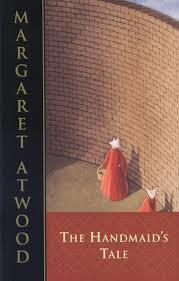 I just finished teaching the Handmaid's Tale (1985) by Margaret Atwood to my American Literature classes. It's a dystopia set in near future United States, which has suffered a coup from the religious right. The Sons of Jacob have implemented a society based on a strict literal interpretation of the Bible. Women can't work or read. Gender Traitors (homosexuals) are executed. Sex is for procreative purposes only. Etc. Most of my students enjoyed the majority of the book, but were disappointed in the ending. The ending is typical of a post-modern novel, and Offred's fate is ambiguous. Offred also completely fails to be heroic. She won't join the resistance or help its cause despite the fact she hates what has happened to her world. She doesn't want to die or be tortured or any of the other horrific fates that the government of Gilead has in store for dissenters. Atwood's point in writing Offred in this manner is to comment on the human tendency to tolerate evil. Even if we think something is wrong, most of us are afraid to rock the boat. France under the Nazis is a good example of this. While the French Resistance did continue to fight, the majority of the French population accepted the occupation of their country by an evil regime. They didn't like it, of course. Just as Offred hates Gilead. But fear, complacency, etc. stopped most from taking action. In the U.S. we like to mock France for this, but Atwood shows its unlikely we'd be any different if it happened here. Fear is a powerful method of social control.
I just finished teaching the Handmaid's Tale (1985) by Margaret Atwood to my American Literature classes. It's a dystopia set in near future United States, which has suffered a coup from the religious right. The Sons of Jacob have implemented a society based on a strict literal interpretation of the Bible. Women can't work or read. Gender Traitors (homosexuals) are executed. Sex is for procreative purposes only. Etc. Most of my students enjoyed the majority of the book, but were disappointed in the ending. The ending is typical of a post-modern novel, and Offred's fate is ambiguous. Offred also completely fails to be heroic. She won't join the resistance or help its cause despite the fact she hates what has happened to her world. She doesn't want to die or be tortured or any of the other horrific fates that the government of Gilead has in store for dissenters. Atwood's point in writing Offred in this manner is to comment on the human tendency to tolerate evil. Even if we think something is wrong, most of us are afraid to rock the boat. France under the Nazis is a good example of this. While the French Resistance did continue to fight, the majority of the French population accepted the occupation of their country by an evil regime. They didn't like it, of course. Just as Offred hates Gilead. But fear, complacency, etc. stopped most from taking action. In the U.S. we like to mock France for this, but Atwood shows its unlikely we'd be any different if it happened here. Fear is a powerful method of social control. In 1990 MGM made an absolutely terrible film version of the story. The acting, script, etc. are awful. It keeps some of the elements of the novel, but rewrites it is such a way that it completely changes the point. The film tries to make Atwood's novel into a typical action movie, and it so doesn't work. Offred becomes a hero. She helps her friend escape. She spies on her Commander for the resistance. In the end, she kills him and escapes with her lover. In addition to being poorly done, the movie has no point.
In 1990 MGM made an absolutely terrible film version of the story. The acting, script, etc. are awful. It keeps some of the elements of the novel, but rewrites it is such a way that it completely changes the point. The film tries to make Atwood's novel into a typical action movie, and it so doesn't work. Offred becomes a hero. She helps her friend escape. She spies on her Commander for the resistance. In the end, she kills him and escapes with her lover. In addition to being poorly done, the movie has no point.My students told me that Hulu is making the novel into a streaming series, which will begin airing early next year. Let's hope they do a better job, but my hopes aren't high. Would the public embrace a protagonist who doesn't even attempt to be a hero? Is it the purpose of fiction to teach us about ourselves and about humanity? Or is it merely to entertain? What are your thoughts?
Published on October 27, 2016 03:00
October 26, 2016
Henry Melton, Science Fiction author extraordinaire
My guest author this week is a science fiction writer who looks like Santa Claus.
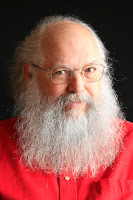 Henry Melton is often on the road with his wife Mary Ann, a nature photographer, and their travels throughout North America, Europe and Africa have inspired his YA series of novels; Small Towns, Big Ideas. The first, Emperor Dad, was the winner of the 2008 Darrell Award for Best Novel and Lighter Than Air won the 2009 Eleanor Cameron / Golden Duck. Henry's short fiction has been published in many magazines and anthologies, most frequently in ANALOG. Catacomb, published in DRAGON magazine, has been called a classic. A new series The Project Saga starts in the current time and stretches through a future where the Solar System is re-engineered and Humanity finds its place in the stars. An online magazine of old and new short fiction is available at HenrysStories.blogspot.com.
Henry Melton is often on the road with his wife Mary Ann, a nature photographer, and their travels throughout North America, Europe and Africa have inspired his YA series of novels; Small Towns, Big Ideas. The first, Emperor Dad, was the winner of the 2008 Darrell Award for Best Novel and Lighter Than Air won the 2009 Eleanor Cameron / Golden Duck. Henry's short fiction has been published in many magazines and anthologies, most frequently in ANALOG. Catacomb, published in DRAGON magazine, has been called a classic. A new series The Project Saga starts in the current time and stretches through a future where the Solar System is re-engineered and Humanity finds its place in the stars. An online magazine of old and new short fiction is available at HenrysStories.blogspot.com.
Interview1. Tell us a little about yourself? — I love to travel. Three or four big family vacations while I was growing up set the pattern. When I married, we decided that even though we were dirt poor and couldn’t afford it, we’d travel anyway. I’ve seen far too many people who decided to put off travel until they could afford it, or until they retired, and then poor health shut down all those plans. So, we traveled. My wife Mary Ann cultivated her nature photography skills, and I was inspired by many of those locations, which formed the settings of many of my novels.2. What made you want to become a writer? — I read science fiction since the fifth grade and grew up in the very early days of NASA space exploration, so since my eyesight was bad enough I could never be an astronaut, I wrote stories instead. At first, they were just for fun, but one day my biology teacher assigned a simple homework task, write the story of a tree. Now, I’m sure he was just looking for a list of the various features of the plant, but he did say story — so I wrote a tale of an intelligent raindrop falling from the sky, entering the roots through the soil and meeting up with an elderly water drop who taught him all the features of the tree before transpiring out the stoma of a leaf. The teacher gave me an A, then read the story out loud in class. I took that same paper and turned it in as an English composition, and got another A. So, two A’s, and some public notoriety off the same work? I was hooked. 3. Could you tell us a bit about your most recent book? — Most recently published is Humanicide, book 5 of the Earth Branch of the Project Saga. That’s a mouthful, but my Saga is a multibranched future history and far too complex to go from book one to book 18 in a simple linear list. Humanicide completes the Earth Branch, which started with Star Time. In this novel, a genetically crafted, artificial human with all the best traits of humanity, decides that with his extended lifespan and superior intelligence, it was up to him to guide humanity, and the first order of business was to kill off 99% of the people and set us back to the stone age where we couldn’t get into trouble with our world-changing technology—all for our own good, of course. That’s what he tells himself, that is. Unfortunately for his plan, there was one other lab-grown human out there, and she was a circuit doctor working among the space habitats and smart enough to detect the beginnings of his pandemic. The story follows several main characters and follows their lives through the greatest Plague the world would ever see.4. What is your favorite writing tip or quote? — The thing I tell everyone who comes to me talking about wanting to be a writer is this: Keep writing. If you are already one of the fortunate few who can take an idea and put it down into words on paper, then the rest is practice. Writing well is a craft, just like music, or painting, or carpentry. You get better by doing it over and over again. Have several stories in the queue, so that if you stall out one one, you can switch over to the next. Just keep on writing.5. Tell us a little about your plans for the future. Do you have any other books in the works? — Many, many books. My Project Saga will take about eighteen books, of which I’ve written seven. Of the dozen YA novels I’ve written, easily half of them have unwritten sequels that I would love to have time to write. In addition, the ideas keep coming. I have a double-handful of unrelated ideas that sit there in my notes or in place-holder short stories that cry out for a full novel treatment. The question is how may years do I have left before I run out of steam.Blog Website FacebookTwitter: @HenryMeltonAmazon Barnes & NobleMy Webstore
Humanicide Blurb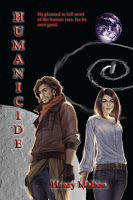 Mars was terraformed, and the biotech engineers could walk on Luna without breathing gear. Earth had three moons and hundreds of orbiting habitats in the Clusters. The great Terraforming Project was hitting its stride, but there were conflicts over which nations would get favored colonization sites on Luna and the antitechnology Three Sins cult was demanding that it all stop.
Mars was terraformed, and the biotech engineers could walk on Luna without breathing gear. Earth had three moons and hundreds of orbiting habitats in the Clusters. The great Terraforming Project was hitting its stride, but there were conflicts over which nations would get favored colonization sites on Luna and the antitechnology Three Sins cult was demanding that it all stop.
But what disturbed Dr. Bet Nomad, circuit doctor for many of the minor habitats in the Clusters was a simple cough that seemed to be found every place she visited. The more she learned, using banned genetic technology, the tighter her own limitations restricted what she could do—she was banned genetic tech herself, living in the shadows lifetime after lifetime. But she was certain something was wrong—something evil.Humanicide is the final chapter of the Earth Branch of the Project Saga. ExcerptAlexandria Habitat, L4 ClusterDr. Bet Nomad crouched down behind a shipping crate as the officer passed by. A transport had too few places to hide. But if she could just wait him out … He had to get back to his command station soon.When the footsteps on the deck plate dwindled, she stood up and tapped on the meter-wide display set into the wall. She dismissed the chart showing the inventory and how it was placed. A few familiar taps and it went into auto-reflection. She stared back at herself. I need to pay more attention to my appearance. I look too young today.She brushed her hair back into place. The screen showed the texture of her skin looking unnaturally smooth today, not at all matching her hair. No one was watching, so she opened her kit and added a few age lines. She needed to look at least forty to match her current bio report.Satisfied, she tapped DOCKING VIEW. Opening like an abrupt rupture into free space, she raised her hand, fighting the illusion that she was looking into vacuum. She squinted, trying to take in the details of the long range view.This view has to be from Alexandria. That’s us.She laughed. Our ship looks like a virus.I’ve got virus on the brain again. Concentrate. Today is public-relations.There was a click on audio. “Dr. Nomad, report to Access G-4.”“I’m already here, Captain Che.”There was no answer. She was annoyed with the man. Stick to piloting and don’t try to entertain me. I’m cargo. The hardest part of every new assignment was the first few hours and she didn’t need his distraction.The display was entrancing to her medical mind. It’s just like a viral attack. A tiny rod-shaped mobile capsule draws near to the membrane of a cell that is enormous in comparison. Soon it will locate a hatchway—a compatible spot of chemistry, and then inject its genetic cargo to hijack the cells life-force for its own ends.A smile attempted to twist her practiced, professional expression. But that makes me the disease!The remote camera watched dispassionately as the transport lined up with the clamps at the hub of the slowly spinning city in space. Latches secured the ship and the walls around her echoed a low metallic clang. The transport ship was being lowered to the rim by the huge external elevator. The docks were at the habitat’s full spin gravity. She could feel no difference—the transport’s own local pseudo-gravity kept everything balanced.Captain Che’s voice echoed again, “Bet, it looks like you have a welcoming committee.”Her smile reverted to a scowl. He’d ferried her twice now. First from Blanco to New Lusaka, and now to Alexandria. He’s getting possessive. She preferred to be invisible, and the voice of experience was nagging. He’d soon be a problem, but the best she could do for now was ignore him.Better check out her greeters. Two assignments earlier, she’d bent a few of the medical restriction rules. Someone might have noticed, and cared enough to track her down.She looked at her massive packing crate and shook her head. I don’t want to have to run again. Too much to lose.
If you like what you've seen, you can buy the novel on Amazon.
And be sure to comment.
 Henry Melton is often on the road with his wife Mary Ann, a nature photographer, and their travels throughout North America, Europe and Africa have inspired his YA series of novels; Small Towns, Big Ideas. The first, Emperor Dad, was the winner of the 2008 Darrell Award for Best Novel and Lighter Than Air won the 2009 Eleanor Cameron / Golden Duck. Henry's short fiction has been published in many magazines and anthologies, most frequently in ANALOG. Catacomb, published in DRAGON magazine, has been called a classic. A new series The Project Saga starts in the current time and stretches through a future where the Solar System is re-engineered and Humanity finds its place in the stars. An online magazine of old and new short fiction is available at HenrysStories.blogspot.com.
Henry Melton is often on the road with his wife Mary Ann, a nature photographer, and their travels throughout North America, Europe and Africa have inspired his YA series of novels; Small Towns, Big Ideas. The first, Emperor Dad, was the winner of the 2008 Darrell Award for Best Novel and Lighter Than Air won the 2009 Eleanor Cameron / Golden Duck. Henry's short fiction has been published in many magazines and anthologies, most frequently in ANALOG. Catacomb, published in DRAGON magazine, has been called a classic. A new series The Project Saga starts in the current time and stretches through a future where the Solar System is re-engineered and Humanity finds its place in the stars. An online magazine of old and new short fiction is available at HenrysStories.blogspot.com.Interview1. Tell us a little about yourself? — I love to travel. Three or four big family vacations while I was growing up set the pattern. When I married, we decided that even though we were dirt poor and couldn’t afford it, we’d travel anyway. I’ve seen far too many people who decided to put off travel until they could afford it, or until they retired, and then poor health shut down all those plans. So, we traveled. My wife Mary Ann cultivated her nature photography skills, and I was inspired by many of those locations, which formed the settings of many of my novels.2. What made you want to become a writer? — I read science fiction since the fifth grade and grew up in the very early days of NASA space exploration, so since my eyesight was bad enough I could never be an astronaut, I wrote stories instead. At first, they were just for fun, but one day my biology teacher assigned a simple homework task, write the story of a tree. Now, I’m sure he was just looking for a list of the various features of the plant, but he did say story — so I wrote a tale of an intelligent raindrop falling from the sky, entering the roots through the soil and meeting up with an elderly water drop who taught him all the features of the tree before transpiring out the stoma of a leaf. The teacher gave me an A, then read the story out loud in class. I took that same paper and turned it in as an English composition, and got another A. So, two A’s, and some public notoriety off the same work? I was hooked. 3. Could you tell us a bit about your most recent book? — Most recently published is Humanicide, book 5 of the Earth Branch of the Project Saga. That’s a mouthful, but my Saga is a multibranched future history and far too complex to go from book one to book 18 in a simple linear list. Humanicide completes the Earth Branch, which started with Star Time. In this novel, a genetically crafted, artificial human with all the best traits of humanity, decides that with his extended lifespan and superior intelligence, it was up to him to guide humanity, and the first order of business was to kill off 99% of the people and set us back to the stone age where we couldn’t get into trouble with our world-changing technology—all for our own good, of course. That’s what he tells himself, that is. Unfortunately for his plan, there was one other lab-grown human out there, and she was a circuit doctor working among the space habitats and smart enough to detect the beginnings of his pandemic. The story follows several main characters and follows their lives through the greatest Plague the world would ever see.4. What is your favorite writing tip or quote? — The thing I tell everyone who comes to me talking about wanting to be a writer is this: Keep writing. If you are already one of the fortunate few who can take an idea and put it down into words on paper, then the rest is practice. Writing well is a craft, just like music, or painting, or carpentry. You get better by doing it over and over again. Have several stories in the queue, so that if you stall out one one, you can switch over to the next. Just keep on writing.5. Tell us a little about your plans for the future. Do you have any other books in the works? — Many, many books. My Project Saga will take about eighteen books, of which I’ve written seven. Of the dozen YA novels I’ve written, easily half of them have unwritten sequels that I would love to have time to write. In addition, the ideas keep coming. I have a double-handful of unrelated ideas that sit there in my notes or in place-holder short stories that cry out for a full novel treatment. The question is how may years do I have left before I run out of steam.Blog Website FacebookTwitter: @HenryMeltonAmazon Barnes & NobleMy Webstore
Humanicide Blurb
 Mars was terraformed, and the biotech engineers could walk on Luna without breathing gear. Earth had three moons and hundreds of orbiting habitats in the Clusters. The great Terraforming Project was hitting its stride, but there were conflicts over which nations would get favored colonization sites on Luna and the antitechnology Three Sins cult was demanding that it all stop.
Mars was terraformed, and the biotech engineers could walk on Luna without breathing gear. Earth had three moons and hundreds of orbiting habitats in the Clusters. The great Terraforming Project was hitting its stride, but there were conflicts over which nations would get favored colonization sites on Luna and the antitechnology Three Sins cult was demanding that it all stop.But what disturbed Dr. Bet Nomad, circuit doctor for many of the minor habitats in the Clusters was a simple cough that seemed to be found every place she visited. The more she learned, using banned genetic technology, the tighter her own limitations restricted what she could do—she was banned genetic tech herself, living in the shadows lifetime after lifetime. But she was certain something was wrong—something evil.Humanicide is the final chapter of the Earth Branch of the Project Saga. ExcerptAlexandria Habitat, L4 ClusterDr. Bet Nomad crouched down behind a shipping crate as the officer passed by. A transport had too few places to hide. But if she could just wait him out … He had to get back to his command station soon.When the footsteps on the deck plate dwindled, she stood up and tapped on the meter-wide display set into the wall. She dismissed the chart showing the inventory and how it was placed. A few familiar taps and it went into auto-reflection. She stared back at herself. I need to pay more attention to my appearance. I look too young today.She brushed her hair back into place. The screen showed the texture of her skin looking unnaturally smooth today, not at all matching her hair. No one was watching, so she opened her kit and added a few age lines. She needed to look at least forty to match her current bio report.Satisfied, she tapped DOCKING VIEW. Opening like an abrupt rupture into free space, she raised her hand, fighting the illusion that she was looking into vacuum. She squinted, trying to take in the details of the long range view.This view has to be from Alexandria. That’s us.She laughed. Our ship looks like a virus.I’ve got virus on the brain again. Concentrate. Today is public-relations.There was a click on audio. “Dr. Nomad, report to Access G-4.”“I’m already here, Captain Che.”There was no answer. She was annoyed with the man. Stick to piloting and don’t try to entertain me. I’m cargo. The hardest part of every new assignment was the first few hours and she didn’t need his distraction.The display was entrancing to her medical mind. It’s just like a viral attack. A tiny rod-shaped mobile capsule draws near to the membrane of a cell that is enormous in comparison. Soon it will locate a hatchway—a compatible spot of chemistry, and then inject its genetic cargo to hijack the cells life-force for its own ends.A smile attempted to twist her practiced, professional expression. But that makes me the disease!The remote camera watched dispassionately as the transport lined up with the clamps at the hub of the slowly spinning city in space. Latches secured the ship and the walls around her echoed a low metallic clang. The transport ship was being lowered to the rim by the huge external elevator. The docks were at the habitat’s full spin gravity. She could feel no difference—the transport’s own local pseudo-gravity kept everything balanced.Captain Che’s voice echoed again, “Bet, it looks like you have a welcoming committee.”Her smile reverted to a scowl. He’d ferried her twice now. First from Blanco to New Lusaka, and now to Alexandria. He’s getting possessive. She preferred to be invisible, and the voice of experience was nagging. He’d soon be a problem, but the best she could do for now was ignore him.Better check out her greeters. Two assignments earlier, she’d bent a few of the medical restriction rules. Someone might have noticed, and cared enough to track her down.She looked at her massive packing crate and shook her head. I don’t want to have to run again. Too much to lose.
If you like what you've seen, you can buy the novel on Amazon.
And be sure to comment.
Published on October 26, 2016 03:00
October 25, 2016
Sherlock Holmes is Elementary
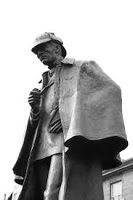 On today's favorite character Tuesday, I will indulge more in my love for the tortured soul by analyzing the greatest detective of all time. Although I've taught Sherlock Holmes in my literature classes and I will be so again, I've never been a fan of Sir Arthur Conan Doyle. Despite the dozens of stories Doyle wrote about him, Holmes is never developed past the rough outlines of his character. There is always an extreme distance between the reader and the character. Also, Holmes does everything too easily. He's too perfect to be of much interest.
On today's favorite character Tuesday, I will indulge more in my love for the tortured soul by analyzing the greatest detective of all time. Although I've taught Sherlock Holmes in my literature classes and I will be so again, I've never been a fan of Sir Arthur Conan Doyle. Despite the dozens of stories Doyle wrote about him, Holmes is never developed past the rough outlines of his character. There is always an extreme distance between the reader and the character. Also, Holmes does everything too easily. He's too perfect to be of much interest. When I saw that Sherlock Holmes is one of my favorite characters, it isn't Doyle's creation I'm Elementary that I have in mind. Sherlock Holmes purists far prefer the Holmes in British TV show Sherlock, but I have to disagree with them. Yes, the British show portrays Holmes closer to the one imagined by Doyle than the American program, but as I said, I'm not really a fan of Doyle, and the Sherlock Sherlock is a dull character.
When I saw that Sherlock Holmes is one of my favorite characters, it isn't Doyle's creation I'm Elementary that I have in mind. Sherlock Holmes purists far prefer the Holmes in British TV show Sherlock, but I have to disagree with them. Yes, the British show portrays Holmes closer to the one imagined by Doyle than the American program, but as I said, I'm not really a fan of Doyle, and the Sherlock Sherlock is a dull character.referring to. Rather it is the Sherlock Holmes of the TV show
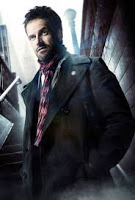 The Elementary Sherlock takes pieces from Doyle's creation, but re-imagines them in ways that creates a very appealing character, the ultimate tortured soul. Sherlock is the child of a cold, unfeeling father who sent him to boarding school very young to get him out of the way and still only sees him as an annoyance to be avoided or as a chess piece to be used. Throughout the first few seasons, Holmes's father would repetitively claim to be coming to visit. Sherlock assured Watson (another great character for another time) that his father wouldn't show, and he never did. In the last season, his father takes a more active role in Sherlock's life, but only because he is using him in a game he's playing.
The Elementary Sherlock takes pieces from Doyle's creation, but re-imagines them in ways that creates a very appealing character, the ultimate tortured soul. Sherlock is the child of a cold, unfeeling father who sent him to boarding school very young to get him out of the way and still only sees him as an annoyance to be avoided or as a chess piece to be used. Throughout the first few seasons, Holmes's father would repetitively claim to be coming to visit. Sherlock assured Watson (another great character for another time) that his father wouldn't show, and he never did. In the last season, his father takes a more active role in Sherlock's life, but only because he is using him in a game he's playing. Because of his father's coldness (and probably other reasons), Sherlock grows up as a person unable to relate to others on a human level. He is a narcissist concerned only with himself. And he becomes a drug addict whose addiction spirals out of control and nearly destroys his life. In Elementary he is trying to put his life back together. To do so, he must learn how to be human. Watson becomes his first friend. We see him struggling to relate to her as a person rather than as a useful piece in his own game. He is often rude and selfish, but he grows as a person as the relationship becomes so important to him that he realizes that he must change his behavior in order to maintain it. I also love that the relationship remains a friendship only. There is not any sexual tension between them. They are friends and partners, not lovers or potential lovers.
Because of his father's coldness (and probably other reasons), Sherlock grows up as a person unable to relate to others on a human level. He is a narcissist concerned only with himself. And he becomes a drug addict whose addiction spirals out of control and nearly destroys his life. In Elementary he is trying to put his life back together. To do so, he must learn how to be human. Watson becomes his first friend. We see him struggling to relate to her as a person rather than as a useful piece in his own game. He is often rude and selfish, but he grows as a person as the relationship becomes so important to him that he realizes that he must change his behavior in order to maintain it. I also love that the relationship remains a friendship only. There is not any sexual tension between them. They are friends and partners, not lovers or potential lovers.But Sherlock isn't magically transformed over night by his relationship with Watson, we see him continue to struggle to apply what he's learned with Watson to other relationships in his life. He grows in a believable manner that makes him one of my favorite characters.
What's your opinion on the Sherlock versus Elementary question? What's your opinion of Sherlock Holmes in any of his manifestations?
Published on October 25, 2016 03:00
October 24, 2016
The Introduction of Darhour
In anticipation of the release of The Ghost in Exile next month, today I've decided to post the scene from The Goddess's Choice in which Darhour is first introduced. The scene can be found near the beginning of Chapter 3. You can listen to the entire chapter here: http://jamie-marchant.blogspot.com/2016/10/the-goddesss-choice-audio-chapter-3.html
Introduction of Darhour
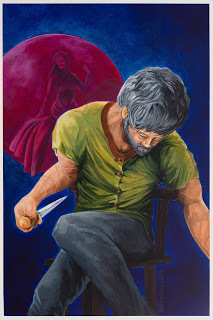 The Master of the Horse scowled at Samantha when she arrived; he and his two assistants were mounting up. Most people found Darhour intimidating, if not downright terrifying. The princess thought he liked it that way. It’s not his fault someone carved horizontal lines all over his face, but he doesn’t have to wear his hair in those stupid Saloynan braids. Still, she grinned at him. “You thought you were going to get away without me?” Darhour scowled deeper, but she saw the smile hidden beneath the scowl. “I’d hoped the late night would cause you to oversleep, Your Highness. You know how His Majesty would feel about this excursion.” She laughed easily, as she always did with Darhour. “I suggest we not tell him. But don’t call me ‘Your Highness’ today. I don’t want people to know who I am. A simple ‘Milady’ will do.” The stable lads brought horses for her and her bodyguards. Vaughansmiled shyly while he held Muffet for her to mount. He was a stringy boy of twelve and gave the impression of having grown too fast. He was nearly as tall as she was, but no bigger around than a fence pole. As always his hair stood up all over his head and was full of bits of straw. “Let’s ride,” she said, as soon as she was in the saddle, and took off. Darhour and the other men had no difficulty catching up. Unlike the princess, Muffet was far too much the lady to do something so undignified as race.They rode out of the palace gates and through the city. As they left Murtaghan behind, Darhour pulled up beside her. “Did you enjoy the ball, Your Highness? Found that someone special yet?” The princess shot him a withering glare, and he laughed until she finally joined him. Darhour was the only one who ever teased her. But she didn’t want to think about the ball, and she certainly didn’t want to think about the strange orange glow that had surrounded Count Pandaran. Darhour’s presence made it harder for her to push such thoughts away. He was the first person she’d ever seen surrounded by color. She’d been fourteen when she went to the stables, hoping the new Master of the Horse would be more reasonable than the man he was replacing. His back was to her as she entered, and as he turned, he’d suddenly burst into color—the green of a meadow on a spring morning. Part of her had been terrified by the strange colors, but the peace that accompanied the green calmed her fear. She’d known immediately Darhour would become a close friend, and unlike nearly everyone else, she’d never been afraid of him.* * *Darhour was happy as he rode beside the princess. He’d had little joy in his life, but every moment he spent in Samantha’s presence was a gift from the goddess, both unexpected and undeserved. “I want to thank you, Your Highness, for intervening to save Vaughan’s job. His family would have been hard pressed if he’d lost it.”The princess laughed, her eyes full of the mischief. Holy Sulis, she’s beautiful. “Vaughan’s a sweet boy, and it was hardly his fault the older boys gave him so much ale he puked all over Count Pandaran’s shoes. I wish I’d been there to see it.”Darhour chuckled. “The count nearly fainted. He wanted Vaughannot only dismissed but flayed. You know how obsessed he is with his appearance. Positively womanish, he is.”Samantha’s eyes narrowed. “Why is it that whenever a man is weak, they say he is womanish? Look at these hands.” She held up a callused palm. “I can use a sword nearly as well as you. Pandaran is most definitely not womanish! Have you ever seen a woman give birth? Do you think Pandaran could do that?”While Darhour knew the princess’s skills weren’t equal to his own, she was far better than Pandaran. “I apologize, Your Highness. How shall I describe the good count?”The princess wrinkled her nose. “Rabbitish. Smooth, soft, and cowardly. I’d rather sleep with my horse.”“I pray it never comes to that, Your Highness!” Darhour grew hot at the thought of any of those at court touching the princess. In another life he’d have castrated any man that tried. But he’d left that life behind, and intervening in her marriage plans wasn’t his place. In fact, he had no right to even take her with him today. If the king found out, it would cost him his job—or worse. But he’d never been able to say no to the princess, just as he hadn’t been able to say no to her mother so many long years ago. The princess suddenly slowed. He reined in and followed her eyes. She was staring at Gloine Torr, which rose out of the plains less than a quarter mile north of the road. The mountain was formed from pure black obsidian and rose over five hundred feet from the valley floor. Shaped as an almost perfect pyramid with the top chopped off, its sides were as smooth as glass, which made climbing it impossible except by the staircase carved into one side. Wide ledges circled it at a third and two-thirds its height. It couldn’t be a natural phenomenon, but he couldn’t imagine how it could have been built either. “Have you ever been to the top?” the princess asked.“No,” he answered. He didn’t tell her he was unworthy to approach the goddess’s holiest shrine. “The king still threatening to place you up there?”Samantha laughed at the long-standing joke. “Regularly. And now I think about it, the old ways of choosing husbands for princesses might not be such a bad idea.”Darhour raised an eyebrow. “You want to stand at the top and see which man can ride his horse up and prove he is the goddess’s choice for your husband?”“Since nobody could do it, wouldn’t it prove nobody was the goddess’s choice? I wouldn’t have to marry at all.” Darhour laughed. “I guess it would at that, Your Highness. Have you made such a proposal to the king?”
The Master of the Horse scowled at Samantha when she arrived; he and his two assistants were mounting up. Most people found Darhour intimidating, if not downright terrifying. The princess thought he liked it that way. It’s not his fault someone carved horizontal lines all over his face, but he doesn’t have to wear his hair in those stupid Saloynan braids. Still, she grinned at him. “You thought you were going to get away without me?” Darhour scowled deeper, but she saw the smile hidden beneath the scowl. “I’d hoped the late night would cause you to oversleep, Your Highness. You know how His Majesty would feel about this excursion.” She laughed easily, as she always did with Darhour. “I suggest we not tell him. But don’t call me ‘Your Highness’ today. I don’t want people to know who I am. A simple ‘Milady’ will do.” The stable lads brought horses for her and her bodyguards. Vaughansmiled shyly while he held Muffet for her to mount. He was a stringy boy of twelve and gave the impression of having grown too fast. He was nearly as tall as she was, but no bigger around than a fence pole. As always his hair stood up all over his head and was full of bits of straw. “Let’s ride,” she said, as soon as she was in the saddle, and took off. Darhour and the other men had no difficulty catching up. Unlike the princess, Muffet was far too much the lady to do something so undignified as race.They rode out of the palace gates and through the city. As they left Murtaghan behind, Darhour pulled up beside her. “Did you enjoy the ball, Your Highness? Found that someone special yet?” The princess shot him a withering glare, and he laughed until she finally joined him. Darhour was the only one who ever teased her. But she didn’t want to think about the ball, and she certainly didn’t want to think about the strange orange glow that had surrounded Count Pandaran. Darhour’s presence made it harder for her to push such thoughts away. He was the first person she’d ever seen surrounded by color. She’d been fourteen when she went to the stables, hoping the new Master of the Horse would be more reasonable than the man he was replacing. His back was to her as she entered, and as he turned, he’d suddenly burst into color—the green of a meadow on a spring morning. Part of her had been terrified by the strange colors, but the peace that accompanied the green calmed her fear. She’d known immediately Darhour would become a close friend, and unlike nearly everyone else, she’d never been afraid of him.* * *Darhour was happy as he rode beside the princess. He’d had little joy in his life, but every moment he spent in Samantha’s presence was a gift from the goddess, both unexpected and undeserved. “I want to thank you, Your Highness, for intervening to save Vaughan’s job. His family would have been hard pressed if he’d lost it.”The princess laughed, her eyes full of the mischief. Holy Sulis, she’s beautiful. “Vaughan’s a sweet boy, and it was hardly his fault the older boys gave him so much ale he puked all over Count Pandaran’s shoes. I wish I’d been there to see it.”Darhour chuckled. “The count nearly fainted. He wanted Vaughannot only dismissed but flayed. You know how obsessed he is with his appearance. Positively womanish, he is.”Samantha’s eyes narrowed. “Why is it that whenever a man is weak, they say he is womanish? Look at these hands.” She held up a callused palm. “I can use a sword nearly as well as you. Pandaran is most definitely not womanish! Have you ever seen a woman give birth? Do you think Pandaran could do that?”While Darhour knew the princess’s skills weren’t equal to his own, she was far better than Pandaran. “I apologize, Your Highness. How shall I describe the good count?”The princess wrinkled her nose. “Rabbitish. Smooth, soft, and cowardly. I’d rather sleep with my horse.”“I pray it never comes to that, Your Highness!” Darhour grew hot at the thought of any of those at court touching the princess. In another life he’d have castrated any man that tried. But he’d left that life behind, and intervening in her marriage plans wasn’t his place. In fact, he had no right to even take her with him today. If the king found out, it would cost him his job—or worse. But he’d never been able to say no to the princess, just as he hadn’t been able to say no to her mother so many long years ago. The princess suddenly slowed. He reined in and followed her eyes. She was staring at Gloine Torr, which rose out of the plains less than a quarter mile north of the road. The mountain was formed from pure black obsidian and rose over five hundred feet from the valley floor. Shaped as an almost perfect pyramid with the top chopped off, its sides were as smooth as glass, which made climbing it impossible except by the staircase carved into one side. Wide ledges circled it at a third and two-thirds its height. It couldn’t be a natural phenomenon, but he couldn’t imagine how it could have been built either. “Have you ever been to the top?” the princess asked.“No,” he answered. He didn’t tell her he was unworthy to approach the goddess’s holiest shrine. “The king still threatening to place you up there?”Samantha laughed at the long-standing joke. “Regularly. And now I think about it, the old ways of choosing husbands for princesses might not be such a bad idea.”Darhour raised an eyebrow. “You want to stand at the top and see which man can ride his horse up and prove he is the goddess’s choice for your husband?”“Since nobody could do it, wouldn’t it prove nobody was the goddess’s choice? I wouldn’t have to marry at all.” Darhour laughed. “I guess it would at that, Your Highness. Have you made such a proposal to the king?”
“I’m working on it.” Despite her light tone, Darhour could sense uneasiness in the princess. He wondered if it was merely because she didn’t wish to marry or if something about Gloine Torr disturbed her.
Tell me what you think. If you want to read The Goddess's Choice, you can find it here:
The Ghost in Exile can be pre-ordered here:
Introduction of Darhour
 The Master of the Horse scowled at Samantha when she arrived; he and his two assistants were mounting up. Most people found Darhour intimidating, if not downright terrifying. The princess thought he liked it that way. It’s not his fault someone carved horizontal lines all over his face, but he doesn’t have to wear his hair in those stupid Saloynan braids. Still, she grinned at him. “You thought you were going to get away without me?” Darhour scowled deeper, but she saw the smile hidden beneath the scowl. “I’d hoped the late night would cause you to oversleep, Your Highness. You know how His Majesty would feel about this excursion.” She laughed easily, as she always did with Darhour. “I suggest we not tell him. But don’t call me ‘Your Highness’ today. I don’t want people to know who I am. A simple ‘Milady’ will do.” The stable lads brought horses for her and her bodyguards. Vaughansmiled shyly while he held Muffet for her to mount. He was a stringy boy of twelve and gave the impression of having grown too fast. He was nearly as tall as she was, but no bigger around than a fence pole. As always his hair stood up all over his head and was full of bits of straw. “Let’s ride,” she said, as soon as she was in the saddle, and took off. Darhour and the other men had no difficulty catching up. Unlike the princess, Muffet was far too much the lady to do something so undignified as race.They rode out of the palace gates and through the city. As they left Murtaghan behind, Darhour pulled up beside her. “Did you enjoy the ball, Your Highness? Found that someone special yet?” The princess shot him a withering glare, and he laughed until she finally joined him. Darhour was the only one who ever teased her. But she didn’t want to think about the ball, and she certainly didn’t want to think about the strange orange glow that had surrounded Count Pandaran. Darhour’s presence made it harder for her to push such thoughts away. He was the first person she’d ever seen surrounded by color. She’d been fourteen when she went to the stables, hoping the new Master of the Horse would be more reasonable than the man he was replacing. His back was to her as she entered, and as he turned, he’d suddenly burst into color—the green of a meadow on a spring morning. Part of her had been terrified by the strange colors, but the peace that accompanied the green calmed her fear. She’d known immediately Darhour would become a close friend, and unlike nearly everyone else, she’d never been afraid of him.* * *Darhour was happy as he rode beside the princess. He’d had little joy in his life, but every moment he spent in Samantha’s presence was a gift from the goddess, both unexpected and undeserved. “I want to thank you, Your Highness, for intervening to save Vaughan’s job. His family would have been hard pressed if he’d lost it.”The princess laughed, her eyes full of the mischief. Holy Sulis, she’s beautiful. “Vaughan’s a sweet boy, and it was hardly his fault the older boys gave him so much ale he puked all over Count Pandaran’s shoes. I wish I’d been there to see it.”Darhour chuckled. “The count nearly fainted. He wanted Vaughannot only dismissed but flayed. You know how obsessed he is with his appearance. Positively womanish, he is.”Samantha’s eyes narrowed. “Why is it that whenever a man is weak, they say he is womanish? Look at these hands.” She held up a callused palm. “I can use a sword nearly as well as you. Pandaran is most definitely not womanish! Have you ever seen a woman give birth? Do you think Pandaran could do that?”While Darhour knew the princess’s skills weren’t equal to his own, she was far better than Pandaran. “I apologize, Your Highness. How shall I describe the good count?”The princess wrinkled her nose. “Rabbitish. Smooth, soft, and cowardly. I’d rather sleep with my horse.”“I pray it never comes to that, Your Highness!” Darhour grew hot at the thought of any of those at court touching the princess. In another life he’d have castrated any man that tried. But he’d left that life behind, and intervening in her marriage plans wasn’t his place. In fact, he had no right to even take her with him today. If the king found out, it would cost him his job—or worse. But he’d never been able to say no to the princess, just as he hadn’t been able to say no to her mother so many long years ago. The princess suddenly slowed. He reined in and followed her eyes. She was staring at Gloine Torr, which rose out of the plains less than a quarter mile north of the road. The mountain was formed from pure black obsidian and rose over five hundred feet from the valley floor. Shaped as an almost perfect pyramid with the top chopped off, its sides were as smooth as glass, which made climbing it impossible except by the staircase carved into one side. Wide ledges circled it at a third and two-thirds its height. It couldn’t be a natural phenomenon, but he couldn’t imagine how it could have been built either. “Have you ever been to the top?” the princess asked.“No,” he answered. He didn’t tell her he was unworthy to approach the goddess’s holiest shrine. “The king still threatening to place you up there?”Samantha laughed at the long-standing joke. “Regularly. And now I think about it, the old ways of choosing husbands for princesses might not be such a bad idea.”Darhour raised an eyebrow. “You want to stand at the top and see which man can ride his horse up and prove he is the goddess’s choice for your husband?”“Since nobody could do it, wouldn’t it prove nobody was the goddess’s choice? I wouldn’t have to marry at all.” Darhour laughed. “I guess it would at that, Your Highness. Have you made such a proposal to the king?”
The Master of the Horse scowled at Samantha when she arrived; he and his two assistants were mounting up. Most people found Darhour intimidating, if not downright terrifying. The princess thought he liked it that way. It’s not his fault someone carved horizontal lines all over his face, but he doesn’t have to wear his hair in those stupid Saloynan braids. Still, she grinned at him. “You thought you were going to get away without me?” Darhour scowled deeper, but she saw the smile hidden beneath the scowl. “I’d hoped the late night would cause you to oversleep, Your Highness. You know how His Majesty would feel about this excursion.” She laughed easily, as she always did with Darhour. “I suggest we not tell him. But don’t call me ‘Your Highness’ today. I don’t want people to know who I am. A simple ‘Milady’ will do.” The stable lads brought horses for her and her bodyguards. Vaughansmiled shyly while he held Muffet for her to mount. He was a stringy boy of twelve and gave the impression of having grown too fast. He was nearly as tall as she was, but no bigger around than a fence pole. As always his hair stood up all over his head and was full of bits of straw. “Let’s ride,” she said, as soon as she was in the saddle, and took off. Darhour and the other men had no difficulty catching up. Unlike the princess, Muffet was far too much the lady to do something so undignified as race.They rode out of the palace gates and through the city. As they left Murtaghan behind, Darhour pulled up beside her. “Did you enjoy the ball, Your Highness? Found that someone special yet?” The princess shot him a withering glare, and he laughed until she finally joined him. Darhour was the only one who ever teased her. But she didn’t want to think about the ball, and she certainly didn’t want to think about the strange orange glow that had surrounded Count Pandaran. Darhour’s presence made it harder for her to push such thoughts away. He was the first person she’d ever seen surrounded by color. She’d been fourteen when she went to the stables, hoping the new Master of the Horse would be more reasonable than the man he was replacing. His back was to her as she entered, and as he turned, he’d suddenly burst into color—the green of a meadow on a spring morning. Part of her had been terrified by the strange colors, but the peace that accompanied the green calmed her fear. She’d known immediately Darhour would become a close friend, and unlike nearly everyone else, she’d never been afraid of him.* * *Darhour was happy as he rode beside the princess. He’d had little joy in his life, but every moment he spent in Samantha’s presence was a gift from the goddess, both unexpected and undeserved. “I want to thank you, Your Highness, for intervening to save Vaughan’s job. His family would have been hard pressed if he’d lost it.”The princess laughed, her eyes full of the mischief. Holy Sulis, she’s beautiful. “Vaughan’s a sweet boy, and it was hardly his fault the older boys gave him so much ale he puked all over Count Pandaran’s shoes. I wish I’d been there to see it.”Darhour chuckled. “The count nearly fainted. He wanted Vaughannot only dismissed but flayed. You know how obsessed he is with his appearance. Positively womanish, he is.”Samantha’s eyes narrowed. “Why is it that whenever a man is weak, they say he is womanish? Look at these hands.” She held up a callused palm. “I can use a sword nearly as well as you. Pandaran is most definitely not womanish! Have you ever seen a woman give birth? Do you think Pandaran could do that?”While Darhour knew the princess’s skills weren’t equal to his own, she was far better than Pandaran. “I apologize, Your Highness. How shall I describe the good count?”The princess wrinkled her nose. “Rabbitish. Smooth, soft, and cowardly. I’d rather sleep with my horse.”“I pray it never comes to that, Your Highness!” Darhour grew hot at the thought of any of those at court touching the princess. In another life he’d have castrated any man that tried. But he’d left that life behind, and intervening in her marriage plans wasn’t his place. In fact, he had no right to even take her with him today. If the king found out, it would cost him his job—or worse. But he’d never been able to say no to the princess, just as he hadn’t been able to say no to her mother so many long years ago. The princess suddenly slowed. He reined in and followed her eyes. She was staring at Gloine Torr, which rose out of the plains less than a quarter mile north of the road. The mountain was formed from pure black obsidian and rose over five hundred feet from the valley floor. Shaped as an almost perfect pyramid with the top chopped off, its sides were as smooth as glass, which made climbing it impossible except by the staircase carved into one side. Wide ledges circled it at a third and two-thirds its height. It couldn’t be a natural phenomenon, but he couldn’t imagine how it could have been built either. “Have you ever been to the top?” the princess asked.“No,” he answered. He didn’t tell her he was unworthy to approach the goddess’s holiest shrine. “The king still threatening to place you up there?”Samantha laughed at the long-standing joke. “Regularly. And now I think about it, the old ways of choosing husbands for princesses might not be such a bad idea.”Darhour raised an eyebrow. “You want to stand at the top and see which man can ride his horse up and prove he is the goddess’s choice for your husband?”“Since nobody could do it, wouldn’t it prove nobody was the goddess’s choice? I wouldn’t have to marry at all.” Darhour laughed. “I guess it would at that, Your Highness. Have you made such a proposal to the king?”“I’m working on it.” Despite her light tone, Darhour could sense uneasiness in the princess. He wondered if it was merely because she didn’t wish to marry or if something about Gloine Torr disturbed her.
Tell me what you think. If you want to read The Goddess's Choice, you can find it here:
The Ghost in Exile can be pre-ordered here:
Published on October 24, 2016 03:00
October 22, 2016
The Goddess's Choice audio, Chapter 4
This week I give you Chapter 4. If you're listening, please leave me a comment.
Published on October 22, 2016 03:00
The Goddess's Choice audio: Chapter 5
This week we move onto Chapter 5 in which Samantha bonds with her new horse and we learn Solar's dark secret. Tell me what you think.
Published on October 22, 2016 01:34
October 21, 2016
5 Ways of Presenting Characters to Your Reader: Character as Image
For me, I have to care about a character before I care about what happens to him/her. If I don't have an emotional response to a character, the plot if boring to me no matter what else it may have going for it. So for me, character creation is the key to fiction. If an author gives me characters I love or love to hate, I can forgive a lot of other weaknesses or shortcomings in their work.
Last week, I wrote about what I believe is the most important point in character development, which is determining what your character wants. If you don't know your character's ambitions, you don't know your character.
 This week, I'm starting a discussion of five ways that a writer has of presenting his/her characters to the reader. The first of these is presenting character as Image. Image is using description in any way that evokes the senses.
This week, I'm starting a discussion of five ways that a writer has of presenting his/her characters to the reader. The first of these is presenting character as Image. Image is using description in any way that evokes the senses.
What does your character look like? The emerald green brilliance of Robrek's eyes.
What does she smell like? The scent of cinnamon that lingers in Samantha's hair from her shampoo.
How does he sound? Father Shylah's raspy voice that reminds one of a gelded goat.
What does your character feel in terms of sensation, not emotion? The smoothness of silk against her skin.
What does she taste like? Or what do things taste like to her? The sticky sweetness of the fruit preserves.
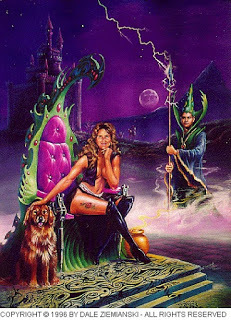 We experience life only through our senses, so if you want our readers to know and care about our characters, we need to have our readers experience them sensually. The more of the reader's senses you can appeal to, the more s/he will be drawn to our characters.
We experience life only through our senses, so if you want our readers to know and care about our characters, we need to have our readers experience them sensually. The more of the reader's senses you can appeal to, the more s/he will be drawn to our characters.
Talk about your character's appearance. Robrek has skin as dark as night or of demons. Tell the reader how she dresses. Samantha's favorite color is green, which brings out the whiteness of her skin and the freckles the speckle her nose. Give your character vivid mannerism or gestures. Lord Dylan has a tendency to curl his fingernails into his palms to hide the paint he forgot to clean out from under his nails. Talk about the objects they carry. Blaine always has his hands full of lists.
Also, a character’s surroundings can tell us a lot about a character. Fergal, Leigh’s father, owes a house that reeks of new money. When Leigh approaches after being a way for some time, he notes:
 While most of the houses in the neighborhood had the quiet dignity of old money, his father’s had the gaudy opulence of newly acquired wealth. It was blindingly white and trimmed in swirling gold and silver designs interspersed with stained glass in every shade of the rainbow. Gilded statuary and marbled fountains littered the space between bushes and trees, which had been trimmed into geometric shapes, along with flowers in beds so precisely spaced they looked unnatural.
While most of the houses in the neighborhood had the quiet dignity of old money, his father’s had the gaudy opulence of newly acquired wealth. It was blindingly white and trimmed in swirling gold and silver designs interspersed with stained glass in every shade of the rainbow. Gilded statuary and marbled fountains littered the space between bushes and trees, which had been trimmed into geometric shapes, along with flowers in beds so precisely spaced they looked unnatural.
Leigh’s room in that house contrasts sharply:
Leigh had allowed no sign of his parents’ wealth and bad taste to penetrate his sanctuary. The walls were a plain brown. The wooden star of Sulis hanging over his bed was their only decoration. Besides the bed, there was only a chest for his clothes, a desk, and bookshelf.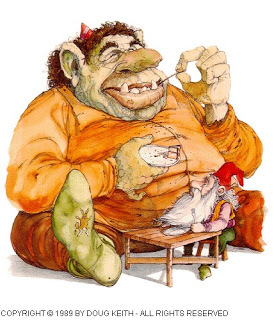 Image how he smells
Image how he smells
From that description alone, the reader knows quite a bit about Fergal and Leigh.
Don’t neglect senses other than sight. Scent can be particularly powerful.
While image is crucial in presenting character, you still need to be careful about going too far. Don’t describe everything in exhaustive detail. A full page description of your character’s outfit will quickly become tedious. Instead, focus on telling details that help to reveal the inner being of your characters.
The image is one of the most crucial tools we writers have of letting our readers know our characters. Don’t forget your senses when you evoke character.
Comment on an author you think uses image particularly well in bringing her/his characters to life.
Last week, I wrote about what I believe is the most important point in character development, which is determining what your character wants. If you don't know your character's ambitions, you don't know your character.
 This week, I'm starting a discussion of five ways that a writer has of presenting his/her characters to the reader. The first of these is presenting character as Image. Image is using description in any way that evokes the senses.
This week, I'm starting a discussion of five ways that a writer has of presenting his/her characters to the reader. The first of these is presenting character as Image. Image is using description in any way that evokes the senses. What does your character look like? The emerald green brilliance of Robrek's eyes.
What does she smell like? The scent of cinnamon that lingers in Samantha's hair from her shampoo.
How does he sound? Father Shylah's raspy voice that reminds one of a gelded goat.
What does your character feel in terms of sensation, not emotion? The smoothness of silk against her skin.
What does she taste like? Or what do things taste like to her? The sticky sweetness of the fruit preserves.
 We experience life only through our senses, so if you want our readers to know and care about our characters, we need to have our readers experience them sensually. The more of the reader's senses you can appeal to, the more s/he will be drawn to our characters.
We experience life only through our senses, so if you want our readers to know and care about our characters, we need to have our readers experience them sensually. The more of the reader's senses you can appeal to, the more s/he will be drawn to our characters.Talk about your character's appearance. Robrek has skin as dark as night or of demons. Tell the reader how she dresses. Samantha's favorite color is green, which brings out the whiteness of her skin and the freckles the speckle her nose. Give your character vivid mannerism or gestures. Lord Dylan has a tendency to curl his fingernails into his palms to hide the paint he forgot to clean out from under his nails. Talk about the objects they carry. Blaine always has his hands full of lists.
Also, a character’s surroundings can tell us a lot about a character. Fergal, Leigh’s father, owes a house that reeks of new money. When Leigh approaches after being a way for some time, he notes:
 While most of the houses in the neighborhood had the quiet dignity of old money, his father’s had the gaudy opulence of newly acquired wealth. It was blindingly white and trimmed in swirling gold and silver designs interspersed with stained glass in every shade of the rainbow. Gilded statuary and marbled fountains littered the space between bushes and trees, which had been trimmed into geometric shapes, along with flowers in beds so precisely spaced they looked unnatural.
While most of the houses in the neighborhood had the quiet dignity of old money, his father’s had the gaudy opulence of newly acquired wealth. It was blindingly white and trimmed in swirling gold and silver designs interspersed with stained glass in every shade of the rainbow. Gilded statuary and marbled fountains littered the space between bushes and trees, which had been trimmed into geometric shapes, along with flowers in beds so precisely spaced they looked unnatural.Leigh’s room in that house contrasts sharply:
Leigh had allowed no sign of his parents’ wealth and bad taste to penetrate his sanctuary. The walls were a plain brown. The wooden star of Sulis hanging over his bed was their only decoration. Besides the bed, there was only a chest for his clothes, a desk, and bookshelf.
 Image how he smells
Image how he smellsFrom that description alone, the reader knows quite a bit about Fergal and Leigh.
Don’t neglect senses other than sight. Scent can be particularly powerful.
While image is crucial in presenting character, you still need to be careful about going too far. Don’t describe everything in exhaustive detail. A full page description of your character’s outfit will quickly become tedious. Instead, focus on telling details that help to reveal the inner being of your characters.
The image is one of the most crucial tools we writers have of letting our readers know our characters. Don’t forget your senses when you evoke character.
Comment on an author you think uses image particularly well in bringing her/his characters to life.
Published on October 21, 2016 03:00
October 20, 2016
Can a sci-fi/fantasy series we love go on too long?
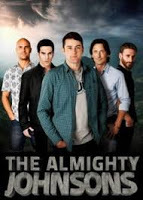 So many great series get cut off in their prime when they are still great and still have so much to say and so many directions they could go. Robin Hood, Roswell, The Almighty Johnsons, The 4400. I could go on.
So many great series get cut off in their prime when they are still great and still have so much to say and so many directions they could go. Robin Hood, Roswell, The Almighty Johnsons, The 4400. I could go on.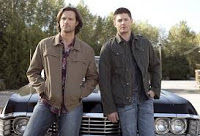 But last night I watched the first episode of Season 11 of Supernatural. (I know I'm behind the times. I don't have television and only watch shows when they make it to Netflix.) But watching it last night got me thinking that some series have the opposite problem. They go on so long they almost become parodies of themselves.
But last night I watched the first episode of Season 11 of Supernatural. (I know I'm behind the times. I don't have television and only watch shows when they make it to Netflix.) But watching it last night got me thinking that some series have the opposite problem. They go on so long they almost become parodies of themselves.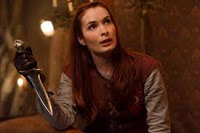 I must admit I was hooked from the time I watched the first episode of Supernatural. I'm a sucker for the tortured soul, and Dean and Sam are the ultimate in tortured souls. They are also damned sexy, which doesn't hurt. In addition to the Winchesters, the series some great minor characters: Castiel, Kevin, Sheriff Mills, Crowley. I absolutely adore Charlie. The series also has great story lines and asks important psychological questions about religion, morality, and what it means to be human. I binge watched it after I first discovered it. (I think eight season were out at the time.) I binge watch whenever a new season becomes available.
I must admit I was hooked from the time I watched the first episode of Supernatural. I'm a sucker for the tortured soul, and Dean and Sam are the ultimate in tortured souls. They are also damned sexy, which doesn't hurt. In addition to the Winchesters, the series some great minor characters: Castiel, Kevin, Sheriff Mills, Crowley. I absolutely adore Charlie. The series also has great story lines and asks important psychological questions about religion, morality, and what it means to be human. I binge watched it after I first discovered it. (I think eight season were out at the time.) I binge watch whenever a new season becomes available.But the series seems to believe it has to keep topping itself. For awhile this was fantastic, but after
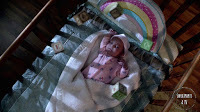 you've been to hell and back a few times, topping yourself can start getting a little ridiculous and increasingly far-fetched. Killing Death and bringing The Darkness into the world at the end of Season 10 really started pushing the boundaries of being over the top. But when I watched, the first episode of Season 11 last night and found out The Darkness has been incarnated in a sweet little newborn baby, I really started thinking enough might well be enough. What are Sam and Dean going to do now? Kill a baby? Allow the Darkness to destroy the world because they can't kill a baby? And it took God to lock the Darkness up at the beginning of time. Just how are two humans supposed to defeat it?
you've been to hell and back a few times, topping yourself can start getting a little ridiculous and increasingly far-fetched. Killing Death and bringing The Darkness into the world at the end of Season 10 really started pushing the boundaries of being over the top. But when I watched, the first episode of Season 11 last night and found out The Darkness has been incarnated in a sweet little newborn baby, I really started thinking enough might well be enough. What are Sam and Dean going to do now? Kill a baby? Allow the Darkness to destroy the world because they can't kill a baby? And it took God to lock the Darkness up at the beginning of time. Just how are two humans supposed to defeat it?I hate to say it because I have loved the series, but it seems like it's time to stop making new episodes. I'm unsure if I'll watch the rest of the season. What are your thoughts? Any series you think went on too long?
Published on October 20, 2016 03:00



